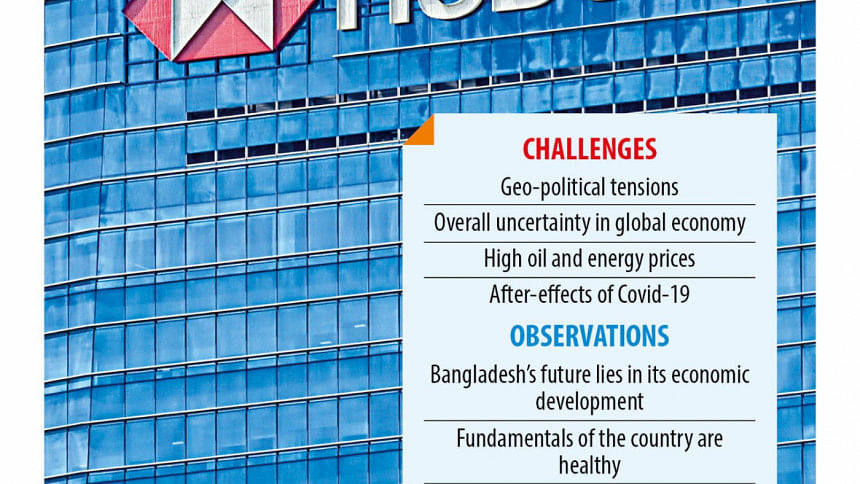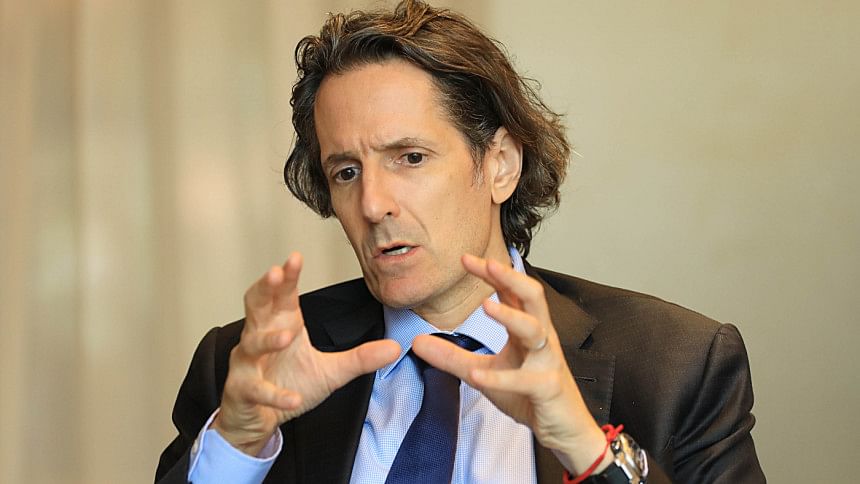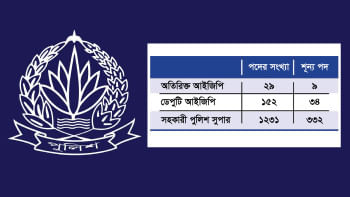Think beyond traditional markets to drive export growth

Bangladesh should consider emerging markets that are growing at a healthy clip and offer growth opportunities to drive up exports instead of keep relying on traditional destinations, said Frederic Neumann, HSBC's Chief Asia Economist and co-head of Global Research Asia.
"Bangladesh should not think about large markets alone. It can think about emerging markets like India and China."
The tapping of the growth potential in the emerging markets will allow Bangladeshi companies to export more goods and services and capture more market share, he said during an exclusive interview with The Daily Star in Dhaka recently.
Currently, Bangladesh relies on major markets such as the European Union, the US and Canada for exports.
The European Union is the largest export market of Bangladesh with almost half of the country's merchandise shipments destined for the bloc. The US is the single largest export market for the country.
He said the European economy is gradually improving following struggles for two years owing to elevated energy prices triggered by the war in Eastern Europe.
"That seems to be normalising now."
Neumann, also the managing director of HSBC Global Research, said interest rates are likely to come down in Europe that should help consumers to spend more. This is expected to help Bangladesh.
He said the US might see a bit of a slowdown after growing strongly last year. Although there are signs of a cooling down in the world's largest economy, there is nothing too dramatic, he said, highlighting the spike in interest rates.
When asked whether Bangladesh can benefit from growth opportunities in major economies, the economist said 20 years ago, most global companies invested in China. Now, Chinese companies want to invest overseas as the country is growing slowly.
Still, China's growth is transforming in such a way that it opens the opportunity for Bangladesh to start exporting.
Japan is now also invested in other countries. However, India offers tremendous scope since it is a large market.

Neumann said he is optimistic about Bangladesh.
"We've seen remarkable resilience during the Covid-19 pandemic, and I think that shows that the fundamentals of the country are very, very healthy."
"There's certainly a hunger in this country for more development and there is a dynamism here to take the country forward."
The economist also talked about geo-political tensions and the overall uncertainty in the global economy.
There are a lot of headwinds in the global economy and geopolitical risks. These lead to a lot of uncertainty and reduce economic growth.
There are also other factors that are holding growth back, he said, citing higher oil and energy prices and the after-effects of the Covid-19 pandemic.
"Despite the headwinds, the global economy is still relatively healthy since there is no financial stress anywhere in the world and there is strong trade growth at the moment," he said.
There are exciting new growth areas and these economies, the Middle East, India, and Southeast Asia are doing well.
"Bangladesh is also doing well," Neumann said.
He also touched upon the ongoing economic challenges confronting Bangladesh. Some of the challenges were triggered by the external environment.
"You saw Covid-19, global energy and fertiliser prices spike, and trade decline. So, it was almost a perfect storm for a country like Bangladesh."
The HSBC official said it was inevitable that there had to be some adjustment and it feels that the Bangladesh Bank has managed remarkably well.
The trade balance in Bangladesh was deeply negative, which became positive. And that's a sign that the economy is already responding to some of these measures being taken, he said.
"The big adjustment has already happened."
He said some economies are still struggling owing to multiple factors, but other countries particularly those located in the Indian Ocean Rim are doing well.
"The Indian Ocean Rim countries are well positioned to grow well in the next few years."
Established in 1997, the Indian Ocean Rim Association is an inter-governmental organisation, comprising 23 countries bordering the Indian Ocean.
"The last 50 years were really about the development of the Western Pacific Rim, but the next 50 years will be the development of the Indian Ocean Rim."
Neumann also highlighted the importance of sustainability.
"If you look at garment exporters, they are under pressure to deliver sustainable products to end-consumers in the West. And they certainly compete riding not only on labour cost and infrastructure but also on their ability to provide eco-friendly products."
"We should think about sustainability as part of the competitive package that a country like Bangladesh can deliver. If we can produce products in a more environment-friendly way, compared to our competitors, this will certainly give us a competitive edge."

 For all latest news, follow The Daily Star's Google News channel.
For all latest news, follow The Daily Star's Google News channel. 



Comments